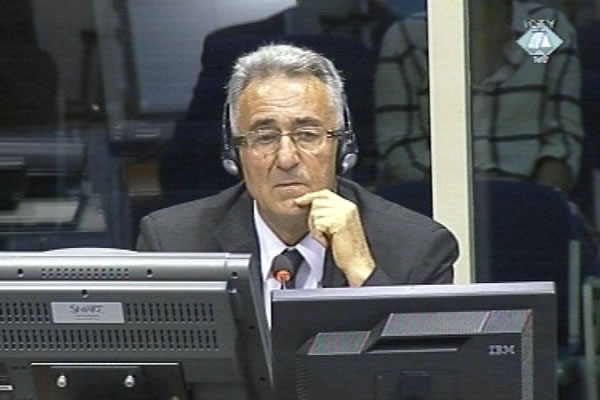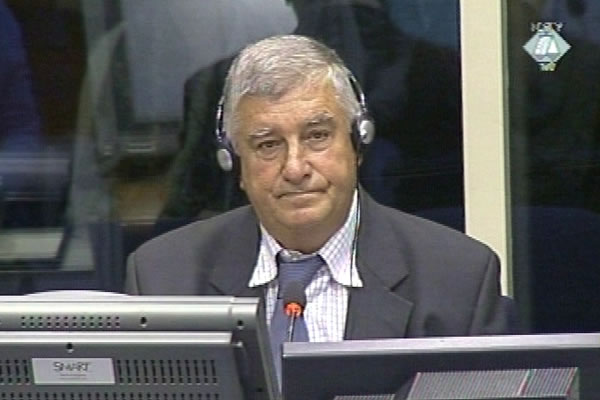Home
CONTRADICTORY VIEWS OF SANSKI MOST CONFLICT
Contradicting the prosecution case, Branko Davidovic, a Bosnian Serb military officer, argued that his brigade calmed inter-ethnic tensions in Sanski Most. According to Davidovic, the brigade was impartial and the operations it carried out in Muslim villages were legal. The prosecutor countered those claims by saying that Davidovic’s brigade was very partial indeed and that the soldiers killed non-Serb civilians
 Branko Davidovic, defence witness at Rako Mladic trial
Branko Davidovic, defence witness at Rako Mladic trial Branko Davidovic, former deputy commander for morale in the 6th Krajina Brigade, gave evidence in Ratko Mladic’s defense today. The witness blamed Muslims and Croats, saying they were the first to get weapons and to start preparing for the war. His unit, Davidovic explained, attempted to defuse the tensions and prevent the conflicts by conducting operations in the Muslim villages, where they seized the weapons. Those operations were legal. Defense counsel Branko Lukic read out just a brief summary of Davidovic’s statement and didn’t have any additional questions for him.
In the cross-examinationprosecutor Edward Jeremy argued that the brigade had been partial indeed. He showed the brigade report for 1992. The document states that the arrival of the unit in Sanski Most sparked enthusiasm among Serbs. Muslims on the other hand were ‘suspicious and hostile’. Davidovic replied that Serbs were afraid that the Second World War crimes would be reprised; this was why they were happy to see the troops. The same document reports that the Sanski Most police purportedly found materials showing that Muslims had been prepared for ‘genocide against Serbs’. The plans involved the gravest crimes: hanging eminent members of the Serb ethnic community in parks, establishing brothels with Serb women where Mujahideen children would be born and maiming male children. The prosecutor noted that such allegations did nothing to the tensions - in fact, they stoked the tensions up. Davidovic replied that the document only conveyed the intelligence obtained by the police. When the officers addressed soldiers, they never talked that way, Davidovic explained.
According to the witness, legitimate mop-up operations, which were in effect attacks to disarm the local Muslim population, were carried out in the villages of Vrhpolje and Hrustovo on 31 May 1992. The indictment against Mladic alleges that on those occasions Serb soldiers arrested and beat a group of Muslims. They then took the Muslims to a nearby bridge, forced the prisoners to jump into the river and opened fire on them. Twenty-eight persons were killed. That same day, as alleged by the prosecution, a group of civilians, including children and a pregnant woman, were executed in the village of Hrustovac. 'This may have happened', Davidovic said, but he did not have any knowledge of the crimes. It was a while later that he heard about a ‘group of bearded men wearing different clothes’killing some men on the bridge in Vrhpolje.
After Davidovic completed his evidence, the defense called Svetozar Petkovic from Foca, a physical education teacher, who served as a soldier in the Bosnian Serb army from Foca. In his statement to the defensePetkovic said that in the first few months of the war there was anarchy in his municipality. Paramilitary units looted property and persecuted people, Petkovic claimed. The witness recounted that a Serb military brigade and a tactical unit in Foca were not established until late June 1992, but it took until the end of 1992 to put numerous paramilitary groups under control.
In a brief examination-in-chief the witness said that he was present when a Serb businessman came to see Marko Kovac, the commander of the Foca tactical unit. The businessman complained that a local commander, Pero Elez, had taken away his truck loaded with household appliances. Elez demanded DEM 5,000 to return the truck to the businessman. In a bid to show just how weak the military command was, Petkovic said that Kovac advised the businessman not to bring any money. Elez would take the money and kill him, Kovac told the man.
In the cross-examination prosecutor MacGregor showed a certificate issued by the Foca municipal authorities, based on the Bosnian Serb armed forces logbooks. The document shows that, contrary to the witness’s claims, Pero Elez was a member of the army from the very beginning of the conflict in Foca on 6 April 1992 until he was killed in December 1992. Petkovic was not surprised to hear that because all Serb fighters were issued certificates of military service from the beginning of the war.
There will be no hearings at the Mladic trial next week. The trial is expected to resume on Monday, 13 October 2014.
Photos
Linked Reports
- Case : Mladic
- 2014-10-01 KOTOR VAROS: FROM CRIME TO GENOCIDE
- 2014-09-30 ‘SHELTERS' FOR DETAINED CIVILIANS
- 2014-09-29 DEMOCRATIC PROCEDURE IN BATKOVIC PRISON CAMP
- 2014-10-13 ROGATICA TEEMING WITH MUSLIM ‘VOLUNTEERS’
- 2014-10-14 PRISONERS WERE KILLED IN LINE WITH GENEVA CONVENTIONS
- 2014-10-15 PROSECUTOR IGNORES WITNESS’S EULOGIES ABOUT MLADIC

